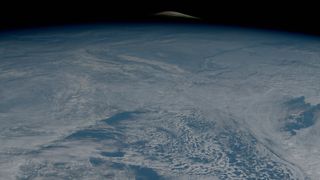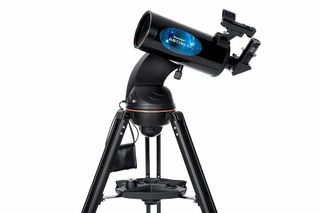The moon's crown peeks above Earth a day before total lunar eclipse (satellite photo)
A Japanese satellite just spotted something special.

Just ahead of a total lunar eclipse, a satellite spotted the curve of the moon floating above our planet.
The Beaver Blood Moon lunar eclipse Tuesday (Nov. 8) will begin at 4:10 a.m. EST (0910 GMT) and will end at approximately 7:49 a.m. EST (1249 GMT) when the moon once again emerges from Earth's shadow. You can watch the total lunar eclipse on Space.com for free, courtesy of several webcasts from observatories across the United States that start at 3 a.m. EST (0800 GMT).
Before that big event, a Japanese satellite spotted something special: the refracted image of the moon hovering just above our planet, thanks the light-bending nature of Earth's atmosphere.
"This morning, Japan's #Himawari satellite saw a weird shape above our planet . . . anyone know what it is?" tweeted Simon Proud, a research fellow at the National Centre for Earth Observation in the United Kingdom, on Monday (Nov. 7).
Proud, who uses open satellite data like that of Himawari's to examine climate change, tweeted a full picture of the moon just a few minutes later to answer his own question. "Downside of playing this game on Twitter, too many of my followers are experts and know the answer," he said.
Related: What time is the Blood Moon total lunar eclipse on Nov. 8?

Looking for a telescope for the lunar eclipse? We recommend the Celestron Astro Fi 102 as the top pick in our best beginner's telescope guide.
If you are hoping to photograph the moon during Tuesday's eclipse, check out our guides on how to photograph a lunar eclipse and how to photograph the moon with a camera. You can prepare for your next moon observing session with our guides to the best cameras for astrophotography and best lenses for astrophotography.
Get the Space.com Newsletter
Breaking space news, the latest updates on rocket launches, skywatching events and more!
If you miss this lunar event, the next total lunar eclipse will occur on March 14, 2025. Partial eclipses will occur in 2023 and 2024. In between eclipse season, note there is a full moon every month, so you can continue to photograph the moon and practice your observing ahead of the next total lunar eclipse.
Editor's note: If you snap a great photo of the Beaver Moon lunar eclipse or any other night sky sight you'd like to share with Space.com and our news partners for a story or image gallery, send images and comments to spacephotos@space.com.
Elizabeth Howell is the co-author of "Why Am I Taller?" (ECW Press, 2022; with Canadian astronaut Dave Williams), a book about space medicine. Follow her on Twitter @howellspace. Follow us on Twitter @Spacedotcom or Facebook.
Join our Space Forums to keep talking space on the latest missions, night sky and more! And if you have a news tip, correction or comment, let us know at: community@space.com.

Elizabeth Howell (she/her), Ph.D., is a staff writer in the spaceflight channel since 2022 covering diversity, education and gaming as well. She was contributing writer for Space.com for 10 years before joining full-time. Elizabeth's reporting includes multiple exclusives with the White House and Office of the Vice-President of the United States, an exclusive conversation with aspiring space tourist (and NSYNC bassist) Lance Bass, speaking several times with the International Space Station, witnessing five human spaceflight launches on two continents, flying parabolic, working inside a spacesuit, and participating in a simulated Mars mission. Her latest book, "Why Am I Taller?", is co-written with astronaut Dave Williams. Elizabeth holds a Ph.D. and M.Sc. in Space Studies from the University of North Dakota, a Bachelor of Journalism from Canada's Carleton University and a Bachelor of History from Canada's Athabasca University. Elizabeth is also a post-secondary instructor in communications and science at several institutions since 2015; her experience includes developing and teaching an astronomy course at Canada's Algonquin College (with Indigenous content as well) to more than 1,000 students since 2020. Elizabeth first got interested in space after watching the movie Apollo 13 in 1996, and still wants to be an astronaut someday. Mastodon: https://qoto.org/@howellspace
